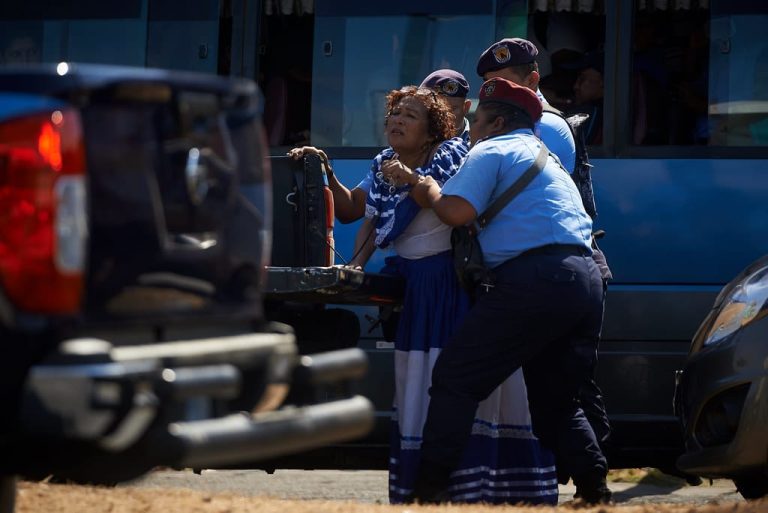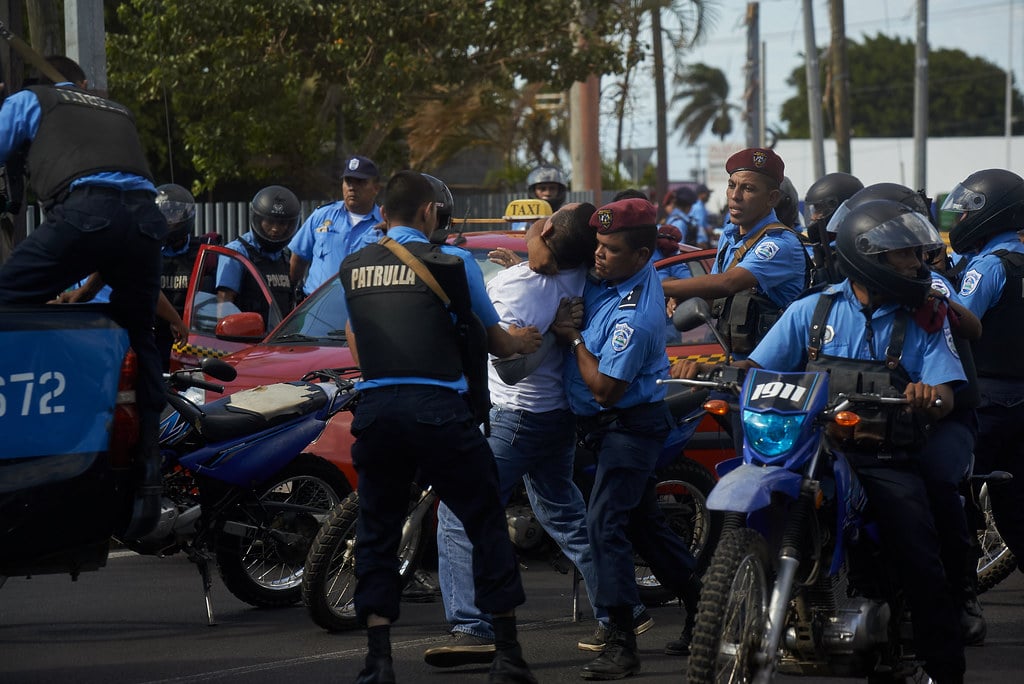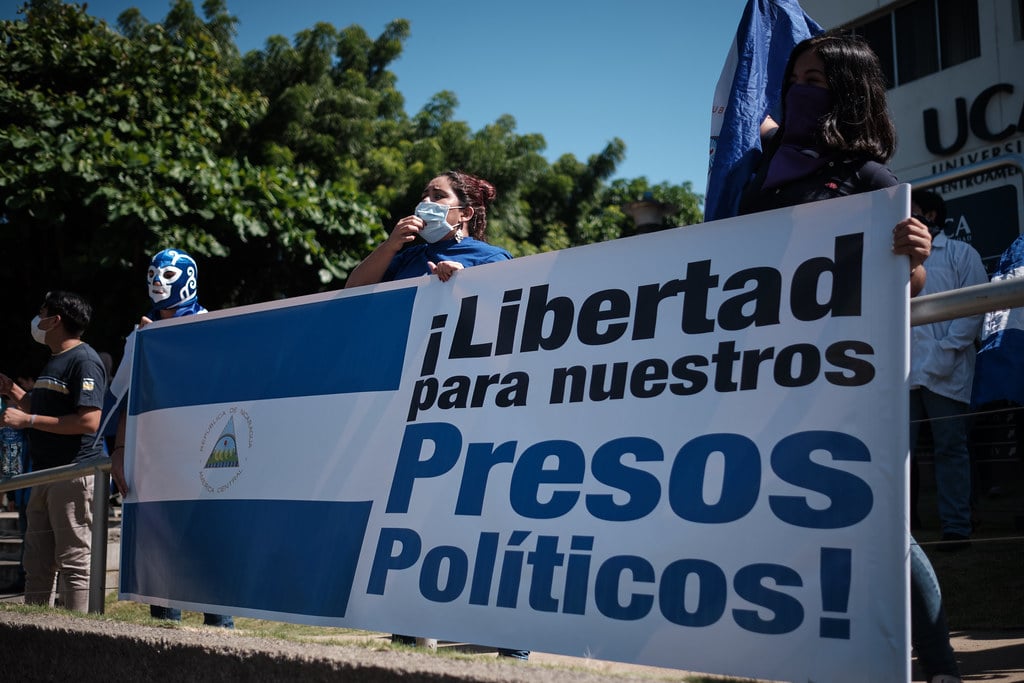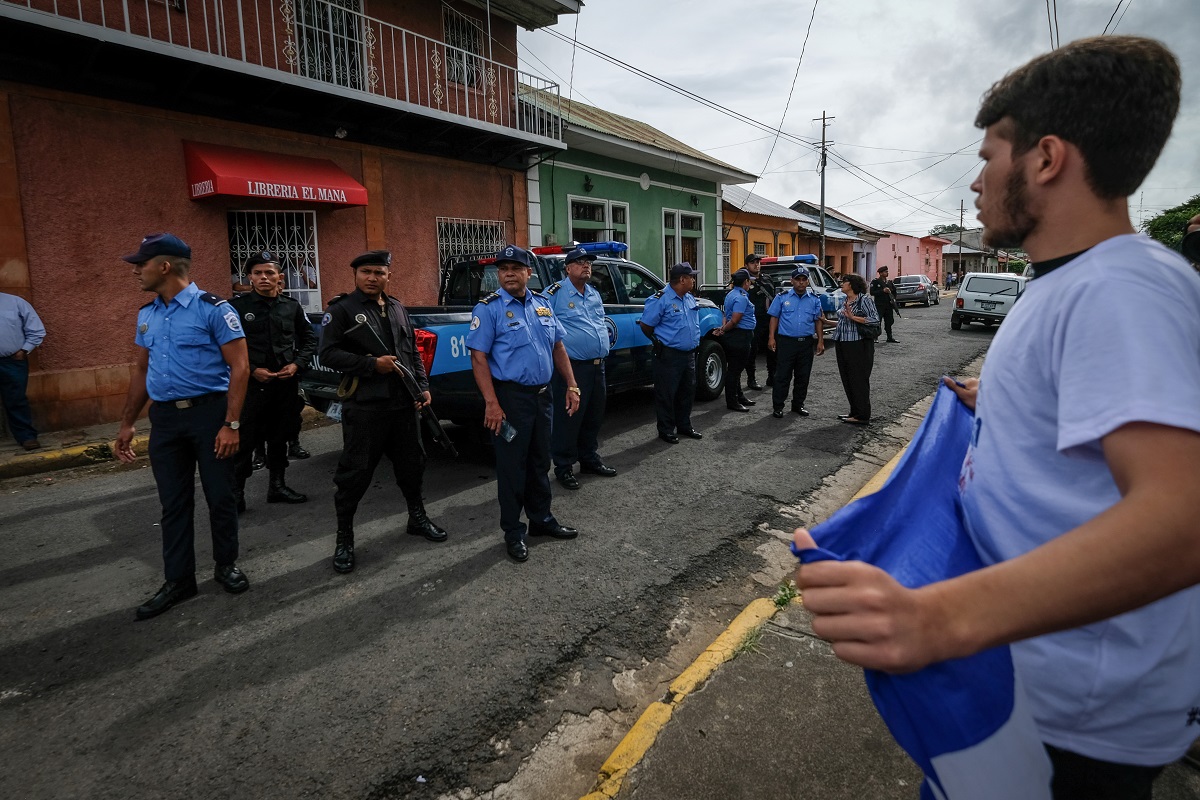3 de diciembre 2020

Children of Exile: The Births “Sowing Hope” in the Camp of Nicaraguan Farmers

PUBLICIDAD 1M
PUBLICIDAD 4D
PUBLICIDAD 5D
The IACHR report notes serious human rights violations in the prison system, a lack of justice, and a police state rife with impunity.

Flor Ramirez, dressed in blue and white traditional clothes, being detained by police during a 2018 protest. Photo: Carlos Herrera / Archives.
Daniel Ortega and Rosario Murillo’s government jailed at least 1,614 people between April 18, 2018 and May 30, 2020. The detentions tracked Nicaraguans who participated in or supported the social protests. This is one of the revelations in a report elaborated by the Inter-American Commission for Human Rights (IACHR).
The Commission, part of the Organization of American States, also found that the political prisoners suffered mistreatment and cruelty. They were kept in crowded conditions and suffered sexual violence in the prison system, among other human rights violations.
The report is titled: “Persons deprived of liberty in Nicaragua in connection with the Human Rights Crisis that began on April 18, 2018.” It’s based on the testimonies of 266 people deprived of liberty. The testimonies were gathered in Nicaragua and in other countries. All the witnesses spoke of human rights violations suffered by those in government detention.
The document begins with an Executive summary of the chief findings. Among them: “Arbitrary detentions and deprivation of liberty have been used primarily to repress any stand taken against the current regime and to send a message of fear and control to the Nicaraguan population.”
Further, the IACHR asserts: “The detentions were carried out by the National Police and by parapolice groups (…) “They may be mass, selective and reiterated, or multiple, often deploying excessive and disproportionate force, including cruel, inhuman, and degrading practices, some of which are tantamount to torture.”
“Detentions have also been accompanied by stigmatization, attacks in the media, persecution, and criminalization,” the report continues.
The report gives an estimate of 1,614 arbitrary detentions in the period covered. However, it notes the difficulty of establishing the true number of political prisoners. “To date, the absence of official registries has made it impossible to determine the exact number of persons detained and criminalized.”
Up until May 31, around 80 political prisoners remain in the country’s jails, according to the document. Reports from relatives of the political prisoners and human rights organizations place the current number at over 100.

“The number of persons deprived of liberty could be notably higher due to detentions that went unreported by the State or else due to the fact that, often, the victims themselves chose not to complain for fear of reprisals. The IACHR notes detentions reportedly carried out by the police forces in coordination with armed groups of civilians, in which the detainees were not taken to official detention centers but spent hours or days in unknown places.” There were also many people who were detained more than once, the organization added.
In their report, the CIDH also affirms that the detentions were carried out without “informing the detainees of the reason for their detention and without showing a court order or judicial warrant.”
Further, “The Commission received numerous complaints stating that detainees were not brought before a judicial authority within 48 hours (…) but rather deprived of liberty in police or clandestine centers or penitentiaries for periods of time ranging from days to months, before being brought before a judicial authority.”
“Based on the testimonies received, some of those detained were taken to illegal or clandestine detention centers, such as municipal or government party installations, before being transferred to police installations.”
The report drew attention to the brutality that was routinely employed. “The detentions carried out by both the National Police and parapolice groups used excessive, disproportionate force, in the form of threats, punches, kicking, and the use of weapons, including shots fired at people, be they participating in protests, located in the vicinity, or the objects of selective detentions.”
“Testimonies reveal that the physical and psychological violence began in the moment of detention itself, but deepened during their entrance into the jail installations. There they were stripped and their belongings taken, forced to do sit-ups. Later, they were shaved and tightly handcuffed, submitted to blows and suffocating holds, humiliations and threats. They were isolated in small cells among other serious acts of violence, including sexual violence. Later they were exposed to interminable interrogation routines,” the report notes.
The IACHR notes the poor conditions in the prisons where people were held. These, “typically included overcrowding, scant medical care, poor ventilation, the removal of detainees’ possessions, impediments to receiving visits, and arbitrary use of solitary confinement.”
Further, “The Commission found persons deprived of liberty being treated by the State as objects for “swaps” or “bargains” aimed at keeping their family members plunged into uncertainty and anguish, inhibiting any acts of social protest, and undermining actions by the opposition and civil society.”
The text denounced “repeated operations by anti-riot police suddenly bursting into people’s cells to beat up, kick detainees, and hit them with police truncheons.” It also noted the extremely poor conditions in the El Chipote jail, the La Esperanza women’s prison, and the men’s prison La Modelo. The political prisoners there were “exposed to unbearably high temperatures, a shortage of beds, insect and animals, little or no daylight, and an almost suffocating lack of air.”
The report received testimony from former prisoners about the problems with food and water in the prisons. Some found “remains of insects, like cockroaches, bits of glass, pieces of metal, and other objects in the food…” Others spoke of their access to water and food being withheld as a means of blackmail or discipline while in prison.

A group of students holding a protest inside the Central American University for the freedom of the political prisoners. Photo: Carlos Herrera
Finally, there was reference to treatment that could be considered torture. “Since the start of the crisis in Nicaragua, the IACHR has received testimonies about electric shocks from tasers, brutal beatings with blunt objects, and humiliation and insults to a point bordering, in some cases, on torture.”
The report made specific reference to the denunciation and testimonies from the women who had been prisoners. These “indicate the commission of cruel, inhumane or degrading treatment or punishment on the part of state functionaries, affecting in a particular and aggravated manner the women detained.”
“The IACHR observes the absence of any differentiated approach with regard to especially at-risk groups, such as adolescents, women, and lesbian, gay, bisexual, trans, and intersex (..) persons,” the document indicates.
The testimonies documented “acts of sexual violence and rape that may be regarded as acts of torture and/or cruel, inhuman, or degrading treatment.”
“In particular, the IACHR notes the existence of patterns that repeated themselves in acts of sexual violence against women, suggesting that they were perpetrated as an additional tool for punishment, repression, and humiliation within the framework of the State’s violent response, especially when women detainees were identified as leaders or as persons who had helped those wounded in demonstrations.”
“Among the serious incidents registered, the IACHR learned of cases of women deprived of their liberty who were victims of inappropriate touching, forced nudity to perform squats, threats of sexual violation, and sexual violations with penetration as a means of obtaining information.”
The IACHR report spoke of the “ongoing systematic practice” of castigating family members of the political prisoners. Conditions that prisoners’ relatives endure include: “harassment, threats, intimidation, and denial of justice, especially by creating anguish and uncertainty about conditions in detention and reprisals against detainees.”
The entire Nicaraguan population “continues to be affected by the continuation of a recurring practice of arbitrary detentions and the imposition of a police state that maintains closed the spaces for democratic participation and seriously restricts or de facto suspends the public liberties.”

Pedro Rodriguez Argueta together with National Police agents in front of the San Antonio Church in Jinotepe, Carazo, July 2019. Photo: Carlos Herrera / Confidencial
The report highlighted the fact that the abuses documented remained uninvestigated and unpunished. “As of the adoption of this report, the incidents it describes remain in impunity.”
“The IACHR is also unaware of any indication that the State has investigated the very serious human rights violations perpetrated since the start of the social protests against persons deprived of liberty, be it at the time they were detained, during their confinement, or following their release.”
“Nor has the Commission received information of any attempt to try and punish officials responsible for the serious violations committed, or any word of a plan to make reparation to the victims in accordance with international human rights standards.”
The report was clear that the Nicaraguan Justice System’s lack of independence contributes greatly to the problems documented. The courts have facilitated the criminalization of the opposition. This occurs through: “the opening of baseless legal proceedings using pre-established, trumped-up charges, the fabrication and/or falsification of evidence, curtailments of the rights to a timely, technical, and appropriate legal defense, the centralization of proceedings and criminal trials, and pervasive use of pre-trial detention and disproportionate sentences.”
The report ends with 27 specific recommendations to the Nicaraguan government. Among these: “Release all those illegally or arbitrarily detained at or during acts of protest or political dissent and who are in detention as of the date of notification to the State of this report.”
It also asks the government to: “Immediately cease arbitrarily and illegally detaining those who participate in the protests or who demonstrate against the government.”
The IACHR asks the government to establish and provide more accurate information regarding the political prisoners. “Draw up and release a public register containing the following information: (a) number of persons who have been detained since the start of the protests on April 18; (b) causes of detention; (c) length of deprivation of liberty; (d) place of detention; (e) number of persons who are currently being detained in connection with the protests that started on April 18; and (f) number of persons released.
“The information should include data on the persons’ gender, age, and occupation.”
Finally, the report asks for an end to impunity. The government should: “Initiate ex officio and immediately an effective investigation to identify, prosecute, and punish those responsible for ill-treatment and torture.
“That investigation should be carried out using all available legal means, aimed at uncovering the truth, and conducted within a reasonable time.
“Likewise, the investigation should be governed by the principles of independence, impartiality, competence, diligence, and thoroughness.”
There seems little chance that the government will accept the report or its recommendations.
The IACHR submitted a preliminary copy of their report to the Nicaraguan government on August 24, 2020. They asked the government “to submit its observations within one month, pursuant to the Commission’s Rules of Procedure.”
The Nicaraguan government failed to respond. Accordingly, the IACHR approved the report without their input on October 5, 2020.
To view the entire report in English click here.
Archivado como:
PUBLICIDAD 3M
Periodista nicaragüense, con dos décadas de trayectoria en medios escritos y digitales. Fue editor de las publicaciones Metro, La Brújula y Revista Niú. Ganador del Grand Prize Lorenzo Natali en Derechos Humanos.
PUBLICIDAD 3D